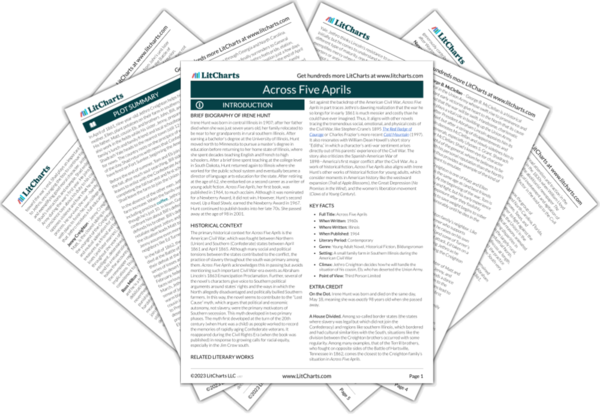Abolitionist Quotes in Across Five Aprils
“Well, I’ll tell you: a half of the country has growed rich, favored by Providence, but still jealous and fearful that the other half is apt to find good fortune too. Face it, Uncle Matt; the North has become arrogant toward the South. The high-tariff industrialists would sooner hev the South starve than give an inch that might cost them a penny.
Then Ellen’s voice was heard, timid and a little tremulous; farm women didn’t enter often into man-talk of politics or national affairs.
“But what of the downtrodden people. Wilse? Ain’t slavery becomin’ more of a festern’ hurt each year? Don’t we hev to make a move against it?”
[…] Wilse brought his hand down sharply on the table. “What the South wants is the right to live as it sees fit to live without interference. And it kin live!”

Unlock explanations and citation info for this and every other Across Five Aprils quote.
Plus so much more...
Get LitCharts A+“I don’t know if anybody ever ‘wins’ a war, Jeth […] a blaze kin destroy him that makes it and him that the fire was set to hurt” […]
“But the South started it, didn’t they, Bill?”
“The South and the North and the East and the West—we all started it. The old slavers of other days and the fact’ry owners of today that need high tariffs to help ’em git rich, and the cotton growers that need slave labor to help ’em git rich and the new territories and the wild talk […] I hate slavery, Jeth, but I hate another slavery of people workin’ their lives away in dirty fact’ries for a wage that kin scarse keep life in ‘em; I hate secession, but at the same time I can’t see how a whole region kin be able to live if their way of life is all of a sudden upset.”
“[…] Jeth, after the thirteenth amendment has become a part of our Constitution and for years afterward [...] there will be men and women with dark faces who will walk the length and width of this land in search of the bright promise the thirteenth amendment holds out to them. […] What’s going to happen to them, Jeth? What will become of men and women who have known nothing but servitude all the days of their lives? They are without experience, without education; they’ll be pawns in the hands of exploiters all over the nation. […] see if [Northern abolitionists] extend the hand of friendship to the uneducated, unskilled men who will come north looking to them as a savior. […] I tell you, all of us are getting a little quieter when the question comes up as to what we are to do about the products of slavery.












